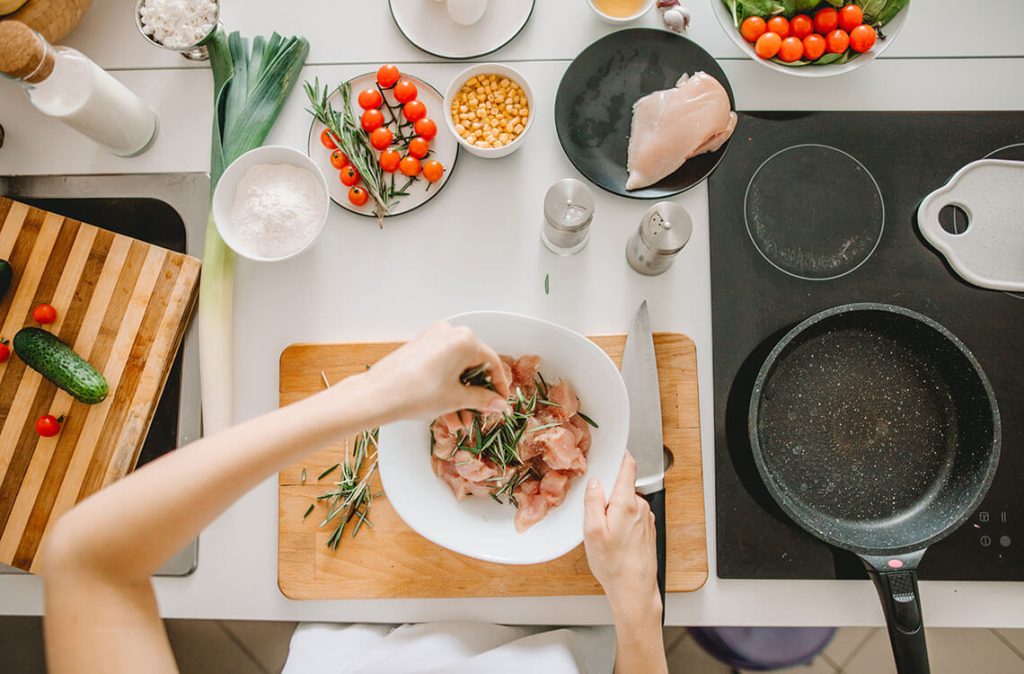If you’re a parent (and if you’re reading this you probably are), then you’ve probably done your fair share of cooking.
Some of these food preparation techniques may be familiar to you; and you may even be guilty of a lot of them.
But you may wondering if this is just blowing things out of proportion.
After all, your mother and grandmother and countless other women throughout your family did these things and you all turned out fine.
But experts have found that these common, everyday cooking habits may just be the things that’s endangering your health without you even knowing it.
Deadly Cooking Habits Revealed
Thawing Meat
It’s a common technique in almost all Asian households to leave frozen animal products to thaw on the counter.
The ambient tropical naturally quickens the defrosting process.
If you’re guilty of doing this, perhaps its time your reconsider.
This method increases the chances of bacteria growing on the surface of the meat.
Experts recommend, thawing your frozen animal products in the fridge the night before you need to use it, or using the microwave at the defrost setting.
It’s understandable that not many people can resort to these options. Especially when it’s a matter of convenience or cost.
You can of course cook meat while it’s frozen, like if it’s for a stew, curry or other gravy-based dish. But not so much for deep frying or sautéing.
So a change of habit is probably in order.
Washing Meat in the Sink
This may sound weird. After all, it’s pretty normal for people to wash their chicken, fish and beef pieces before cooking. Right?
Experts say that just because it’s commonplace doesn’t mean people should be doing it.
The problem lies in the bacteria that is present on all animal products like E.coli.
Scientists say that washing your meat in the sink will splash the washing water all over the sink. Through microscopic droplets that you cant’ see.
This will only end up contaminating your cooking space, your countertops, your entire kitchen.
And yes, even other nearby ingredients and food items with the same bacteria that is present on the meat.
Ironically, the meat you wash won’t even technically be free of germs, not until you cook it with strong heat. So instead of washing, take a paper towel and dab your meat dry.
This will take off any unpleasant-looking residues left over from the market.
Using Non-Stick Pans
We all love non-stick pans. They make cooking (and cleaning) much, much easer.
But they may pose a hidden danger if not used in the proper way. Of course, there’s nothing wrong with non-stick pans, not when they’re brand new.
But experts say you should always replace them every five years. Especially if there are visible scratches and rust spots.
As revolutionary as non-stick pans are, they’re not permanent. The Teflon layer that coats the bottom of most non-stick cookware naturally erodes overtime through wear and tear.
If you consume the pieces of Teflon, it may increase your chances of developing unpleasant medical conditions like kidney and liver failure.
Perfluorooctanoic acid or PFOA, the substance that is to blame for these symptoms, is often used to make Teflon pans.
So if you want to reduce your chances of being exposed to this chemical, look for a non-stick pan that is PFOA-free.
Overheating Oil
You generally shouldn’t let cooking oils come past its smoking point.
What this means is that the oil literally starts releasing fumes after being left on the fire for too long.
This is especially true for oils with low smoking points like coconut oil and extra virgin olive oil (EVOO).
You should ideally only be using EVOO as a dressing, not for cooking, or frying, or anything with heat.
Heating up EVOO will break down it’s components and convert the compounds it into toxic byproducts. It goes without saying that you shouldn’t be consuming these byproducts because they can potentially be cancerous.
Not to mention, you’ll be burning off any nutritional value that’s contained in the oil.
Not Washing Produce
One thing that you should wash after buying from the grocery store is veggies and fruits.
You can either run them under cold water and then let them dry, or soak them in a water-vinegar bath to neutralise any leftover bacteria.
Then, after they’ve been thoroughly cleaned, you can store them in the fridge.
Make sure to follow these storage tips as well to prolong the shelf life of your produce.
That way you won’t find them all rotten at the bottom of your fridge after only three days.
Washing produce helps to extend their freshness as well as make them safer to eat. So always wash your fresh produce before storing them. Except eggs. Never wash eggs after you get them from the market.
It will compromise the natural protective layer of the shell and introduce the salmonella bacteria into the egg.
Following Basic Food Safety Tips
It may be hard to modify your cooking methods, not when it’s literally be engrained into you by past generations.
You may also think that it’s not a big deal since you haven’t experienced any unpleasant effects. Yet.
But just to not tempt fate, see if you can follow these precautions next time you’re in the kitchen cooking.
You may find that many of these tips make sense in the grand scheme of things.
Whatever the case is, you’ll definitely be reducing your chances of contracting food poisoning.
And that means safe, healthy and consequence-free mealtimes for the entire family for many years to come.
Disclaimer: The information provided in this article is for informational purposes only and should not be considered as medical advice from Motherhood. For any health-related concerns, it is advisable to consult with a qualified healthcare professional or medical practitioner.
For more insightful stories and fun recipes, stay tuned to Motherhood Story!
